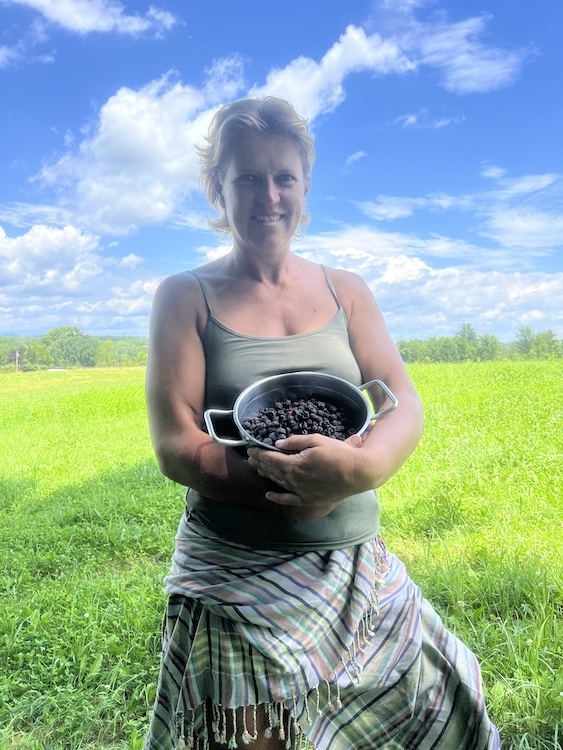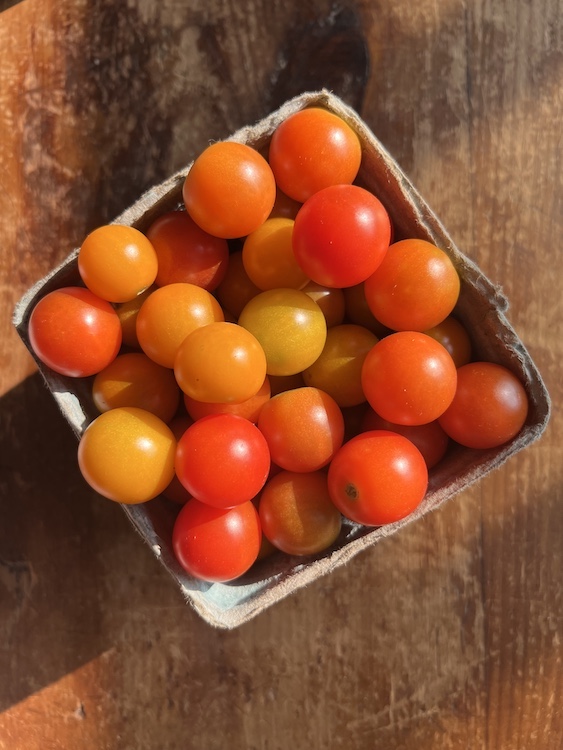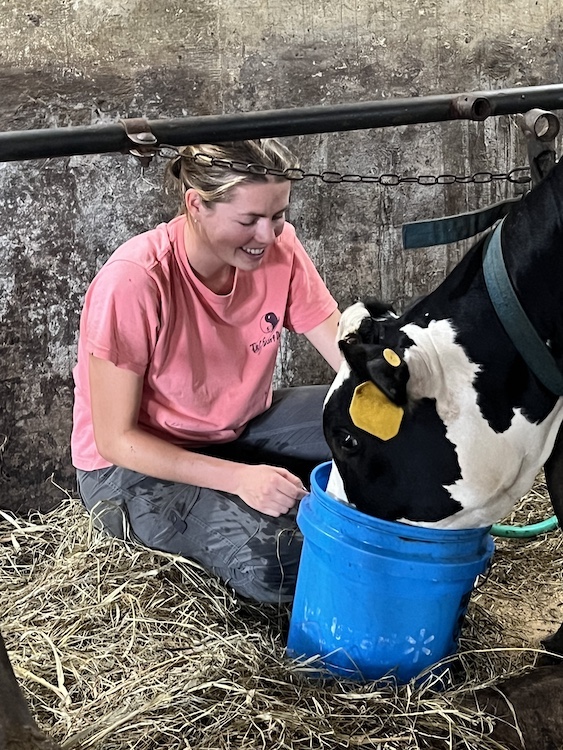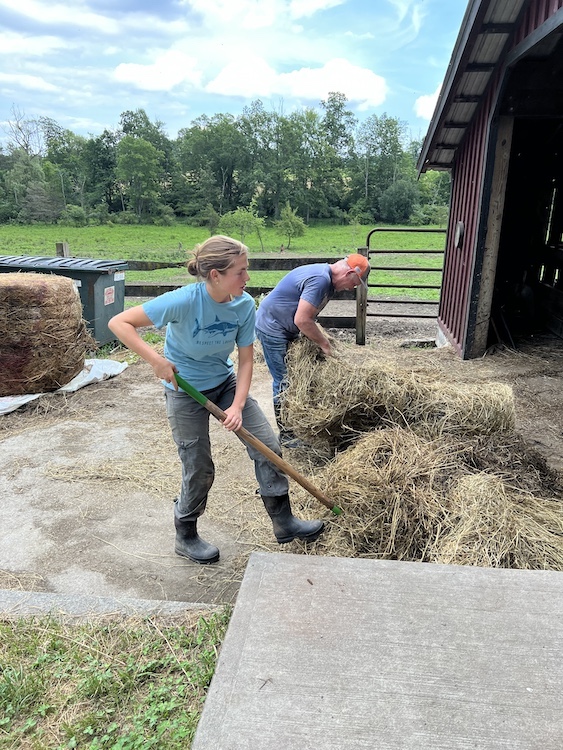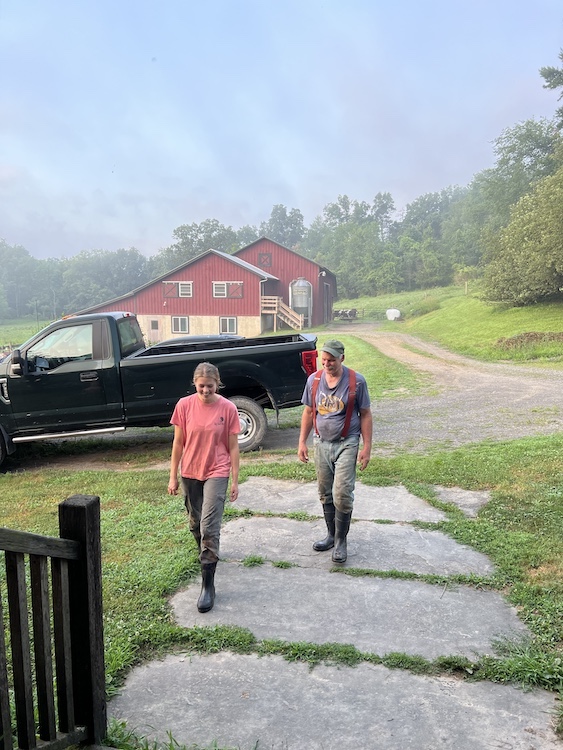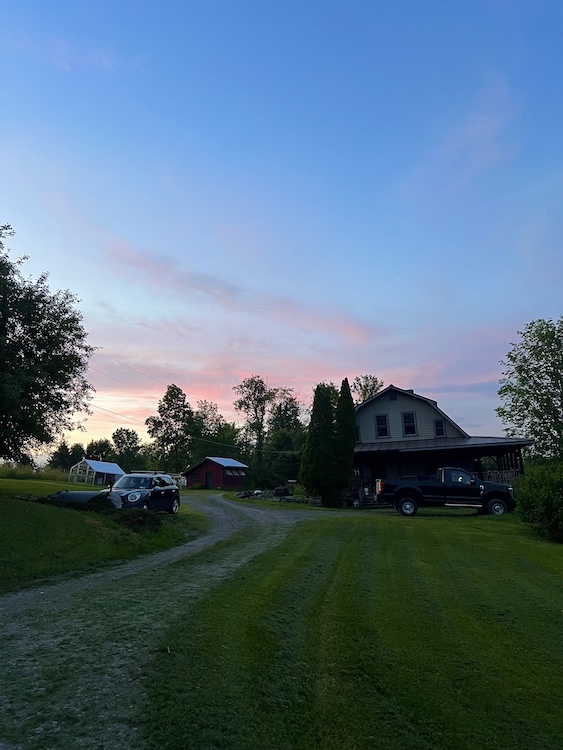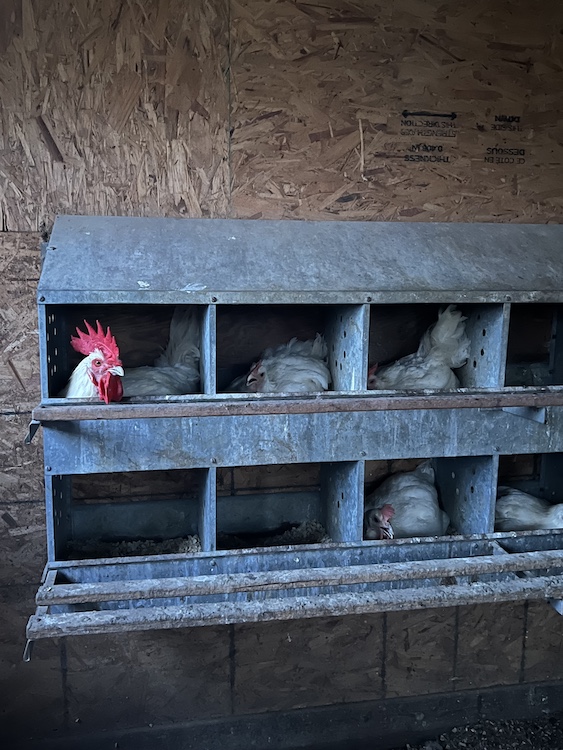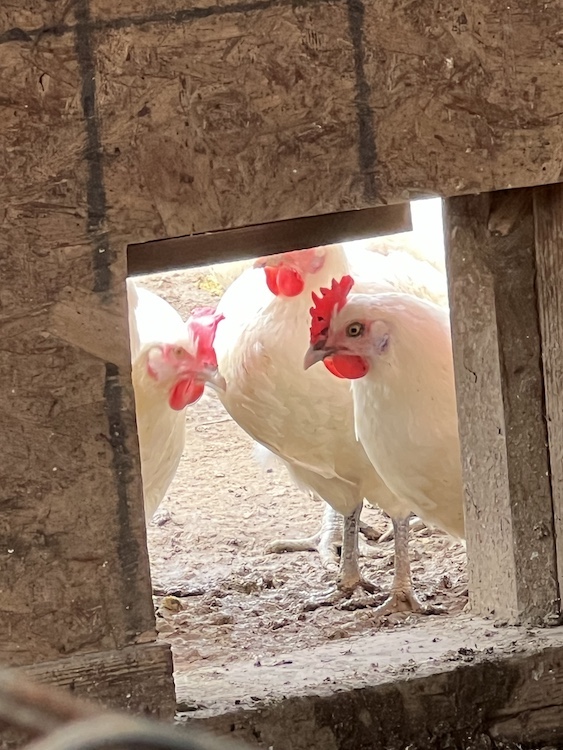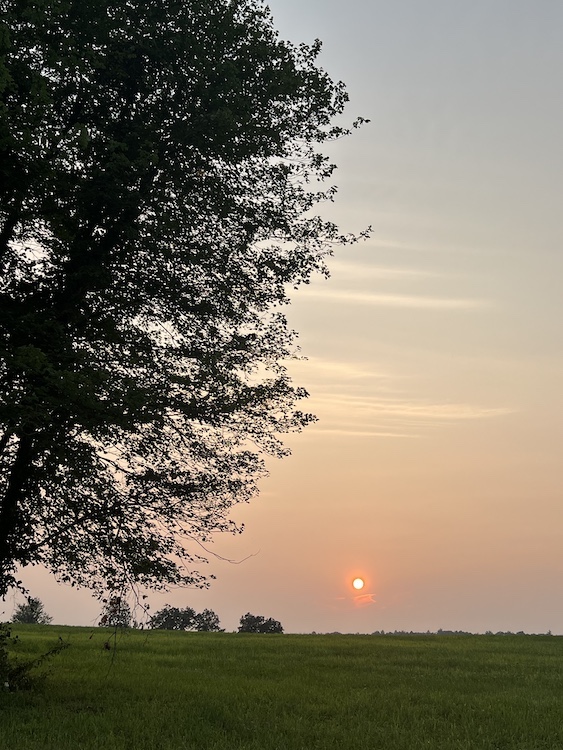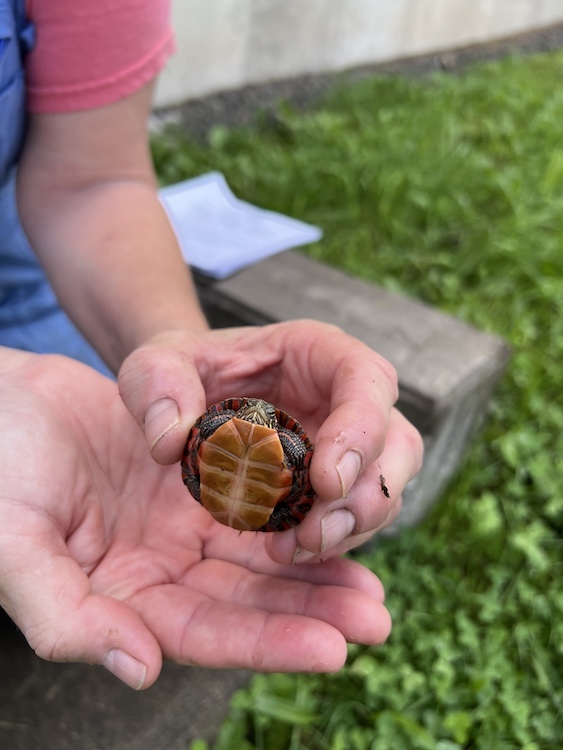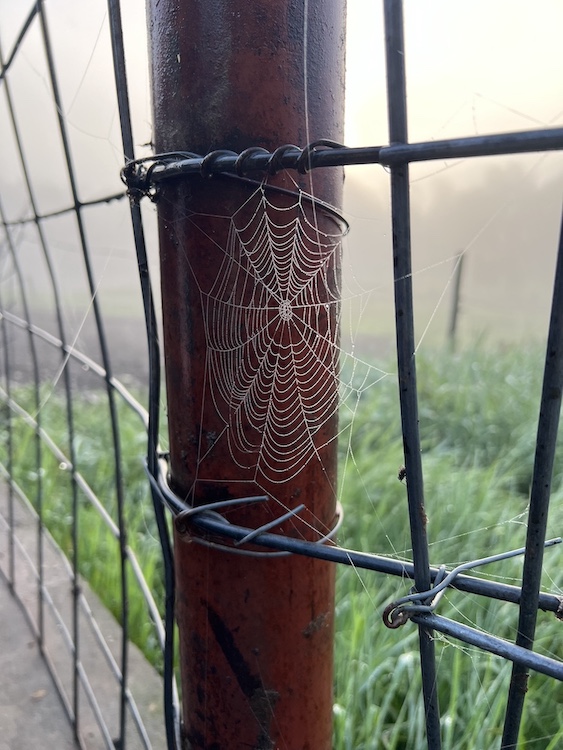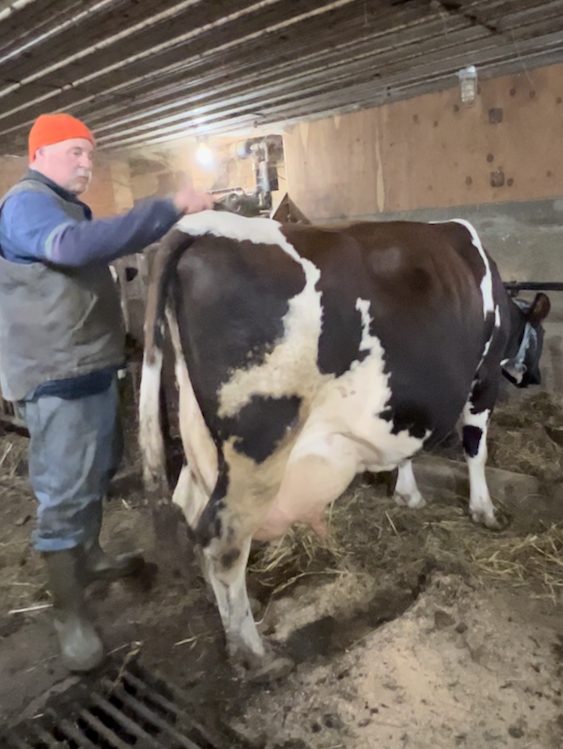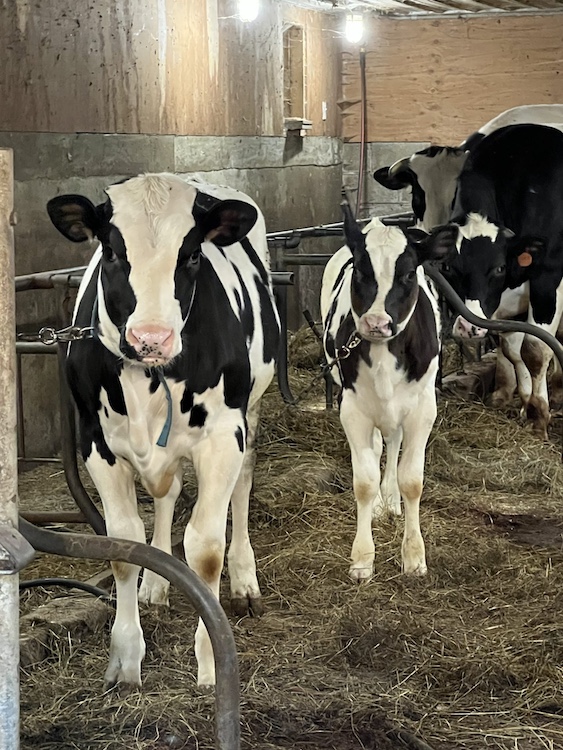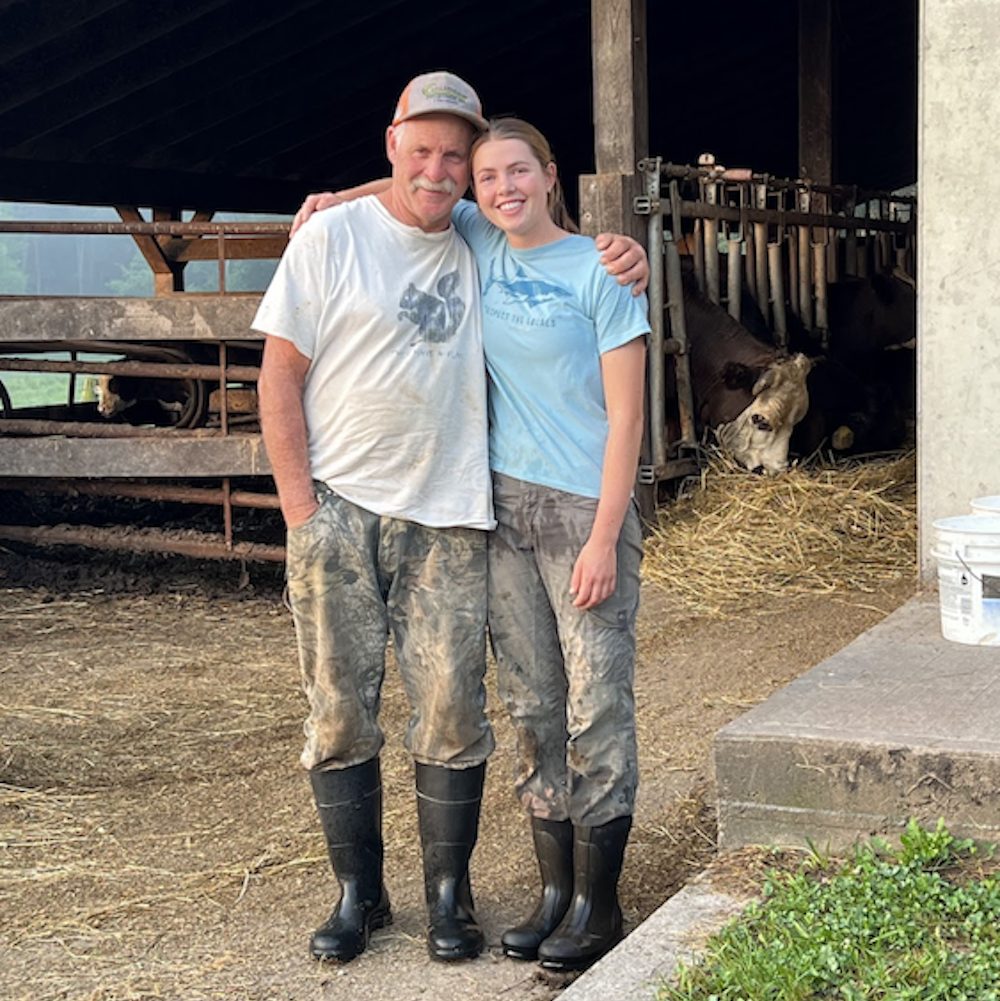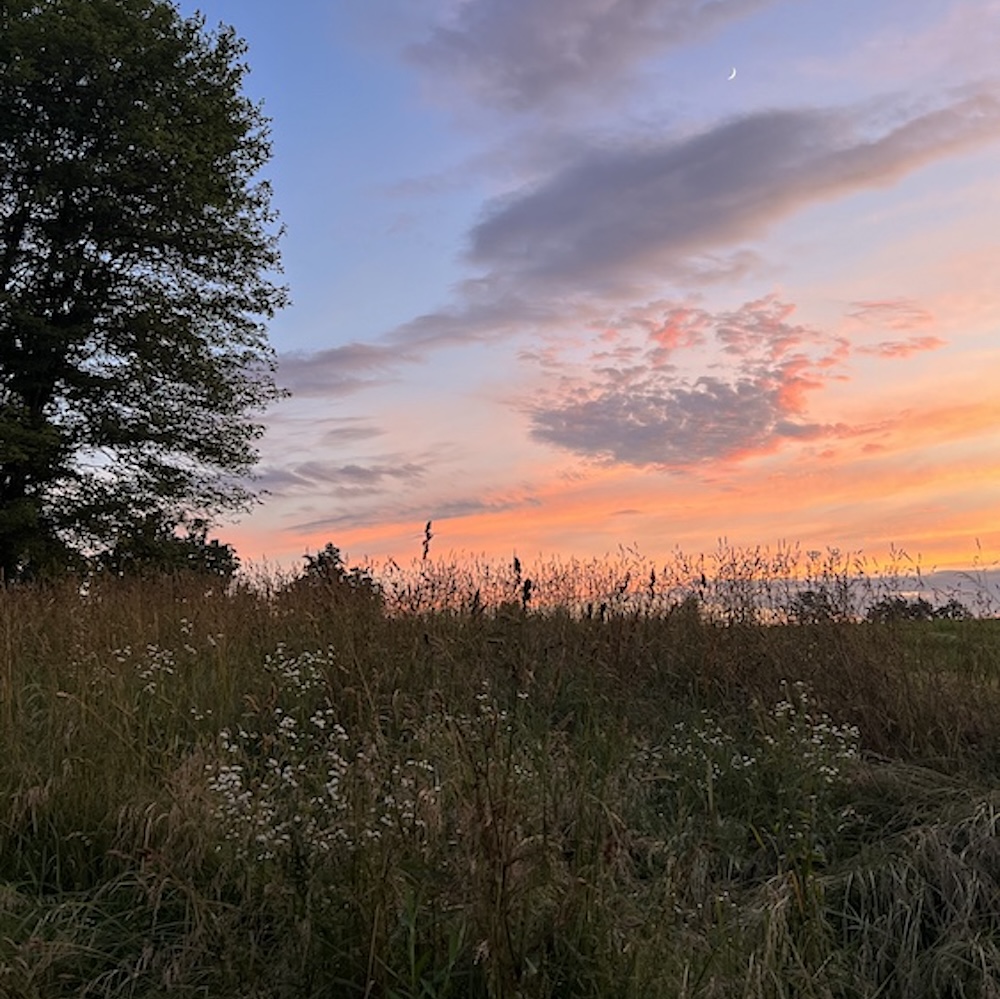
Gimme the Dirt…On Beauty
We’ve had quite a few interesting guests this summer. First, an Olympic athlete from South Africa came to stay for about 10 days—a human being who looks like she sprang from Zeus’ thunderbolt, tall, statuesque, and in peak physical form. Rika was on vacation, but she worked with us, too. She learned to milk the cows and made cheese with me. And on that most American holiday, July 4th, we made butter during our cookout from the cream we’d saved from a few milkings. Butter is her health food; we passed the churn around the porch to all our guests, and when it was finished, we tasted it on little pieces of bread. The next morning, Rika melted it in her coffee! We watched fireworks from the top of our hill, and we couldn’t decide which we preferred: the splashy explosions of color coming from the mountainside, or the wild blaze of fireflies that filled the meadows around us. The next day, we picked blackcaps in the hedgerows, with my husband working in a hayfield nearby. I caught him laughing from the tractor seat, and later, when I asked what was so funny, he said, “Her legs are as long as you are tall, and you both looked so funny walking side by side like that!” I’m 5’1″, Rika is well over 6 feet tall, and I’m quite sure we looked like a Shetland pony stomping along next to a Thoroughbred racehorse, or maybe Mutt and Jeff is a more accurate reference.
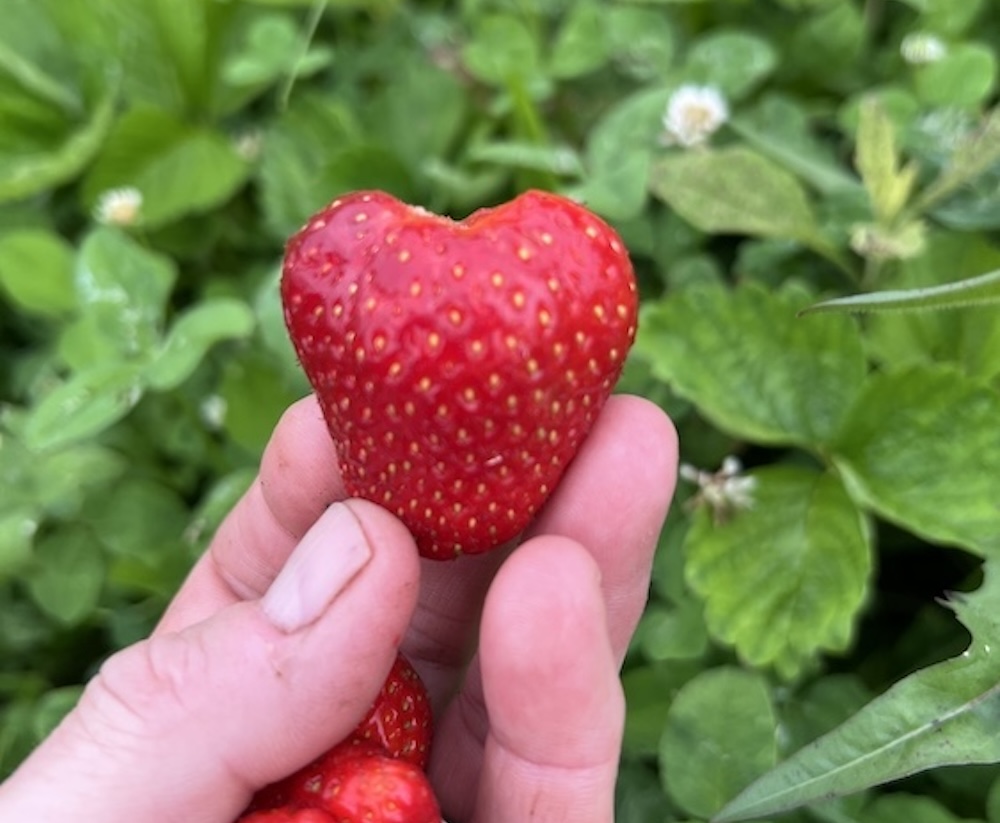
The same day Rika vacated the guest room, our apprentice from the Anne Saxelby Legacy Fund arrived. Viola bounded out of the car, her blond braid flying in the wind. When we asked if we could help with her luggage, she presented a single backpack and said, “I’ve got it!” We came to call her “our California girl,” and watched her settle into the farm as if she were born to it. She worked hard. And when she wasn’t working, she was pedaling the old barn bike for a casual 45-mile ride around the county. I could hear so much laughter and conversation coming from the barn during chore time, and every morning she asked each of us, “How’d you sleep?” Her outer beauty was outshone by an inner light we felt shimmering on us every moment of her stay. Even now, after her return to California, just seeing her name pop up in a text message makes us feel warm inside.
There’s something beautiful about the connections this farm brings into our lives. But it’s even more wonderful watching our guests see what we see and live in it for a while. The work is hard – sometimes brutal, even – but the beauty is constant, pervasive, and as far as the eye can see. We inhabit a real-life Garden of Eden. We sometimes feel judged if we use a religious label, and stating our adherence to a specific practice is often interpreted by others as our being judgmental in return. The truth, however, is that both of us have a deep belief in a greater, guiding Spirit we call “God,” while others refer to it as “the Universe,” “Yahweh,” “Allah,” “Parvardigar,” or “Mother Nature.” Since leaving a church that was spiritually unhealthy for us a few years ago, this farm has become the sanctuary where we pray. The barn is our confessional, our dairy cows during milking time, our confessors. Sometimes when I’m in the chicken coop, I feel like I’m back in our old church. The hens are of French origin, and I imagine they are saying to each other in a condescending tone, “Oh, it’s her. Pretend we don’t know her. What IS she wearing?” I collect their delicious eggs with thankfulness, even if I need to wear thick leather gloves in order to avoid sharp, pecking beaks. They accept my handouts of kitchen scraps and grass clippings with enthusiasm, but their gratitude is decidedly lacking. Much like the Bible wants us to do, I love them anyway. Perhaps my chickens are a metaphor for real-life truths: that it is only with some of the ugliness of life that we can fully appreciate the beauty contrasted against it. Truth be told, it is here on this farm where we feel closest to our “higher power.” We don’t ever want (or need) to go anywhere else.
Beauty, of course, is a subjective concept; in other words, it’s only in the eye of the beholder. What we view as beautiful, soul-filling, and awe-inspiring might leave the person standing next to us flat and unmoved. Conversely, what stirs the heart of someone else might leave us scratching our heads. It’s this conflict of viewpoint that has caused very real conflict in our daily lives. We are rural people. That doesn’t mean we are ill-informed, uneducated or ignorant. It simply means we have a different point of view. How we see is governed by our farm life – the farm is the filter through which we literally view everything else. Watching our cows tells us everything we need to know about them: the quality of their feed, the kind of mothers they are, their roles in the herd and their overall health, to name a few. We apply that same watchfulness to humans, too, because as much as we love watching our cows, people-watching is far more entertaining. What we’ve seen lately, though, is disconcerting. It looks to us as if our beautiful place – our valley home – is also thought to be beautiful by many others, which you’d think would be a good thing. However, these “others” are transplants to our hometown, and they seem to think they know better than we natives somehow.
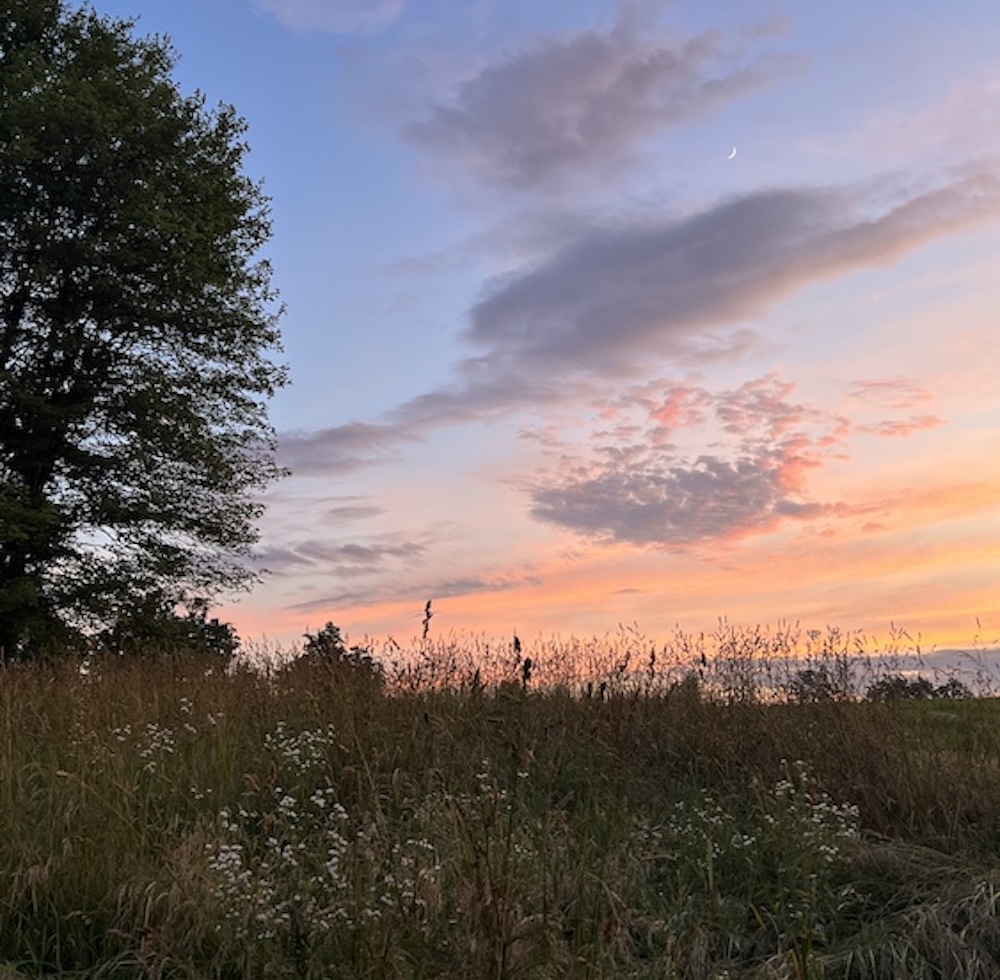
A meadow filled with goldenrod and milkweed gets renamed “property;” cool, dark woods are cleared to “let in the light.” Some, but not all, of the new arrivals view land as a commodity to be mined for personal wealth, profiting from its sale, development, and resale, ultimately becoming the vehicles of the destruction of rural culture. Don’t get me wrong: there’s a LOT of money to be made, with all the gorgeousness there is in this pastoral place. But land is not simply an asset to add to a portfolio. Our farm is an island of beauty in a rapidly developing place, and the thought of dividing it up into lots to be built into more uninspired black, modern boxes makes us both physically ill. What’s the value of it to us as developable land? We could retire with all the physical comforts we could ever desire. But our consciences would not be clean.
I’ve already said what this place means to us on a holy level – it nourishes our spirits as much as the food we raise sustains our bodies. And they’re both necessary to our survival. I have a renewed appreciation for how the original inhabitants of this land might have felt as they were forcibly removed from here. When I was very young, I was fascinated with the Native Americans. I learned in school about our native tribe – the Esopus people, the greater tribe of Lenni Lenape, and their nation: the Algonquin. I remember feeling heartsick about their displacement, how they fought the Dutch settlers so fiercely to protect their homeland, and what my family’s residence here meant. Third grade me brought the question to my dad, along with the statement that we needed to make it right somehow. His wise – and brittle – answer has shaped my thinking to this day: “Well, alright then…if that’s really how you feel, then we need to start packing up all our things, and we need to leave here and hand it all back to them.” The ethical dilemma I felt all those years ago is still painful to confront now.
Confronting it is a daily occurrence since we, too, often feel like we are being displaced. I can’t help but think about the “tech bros,” who fill their wives’ faces (and sometimes their own) with plastic and who are buying up some of our most beautiful places. For what purpose? Perhaps to hoard it, as they do the rest of their possessions. I also wonder this: if they are willing to go to such horrific lengths to enhance their persons to meet their own idea of beauty, what makes us believe that they’ll treat the land any differently? I think of our guests from this past summer, and seeing this valley through their first-time eyes, how they took it all in, and often uttered the same phrase: “It’s so beautiful here.”
As summer slips casually into the cool-laced breezes of autumn, we are preparing for projects that will keep us buried under a mountain of work until the snow flies. We are excited about it all happening, as it means a long-held dream is finally coming to fruition. We look forward to autumn’s approach every year, even this one with its impending workload. It’s our favorite season, something that connected us when we were dating, and which has sprinkled magic over us every year since.
The cows are happier in the autumn, enjoying crisp nights outside in the pasture. There is enormous beauty even in the small acts of caring for our creatures. I want the chicken coop to hold the warmth of the noonday sun, so I close the windows each night. The hens who cozy up on their nests (and the errant rooster who does the same), the calves who wildly run in the early evenings, tails held high like the little flags on the back of boats as they cruise around the pasture, and the barn cats who follow me around meowing loudly for a wee bit more milk fresh and warm from the cows – all of these animals hold their own unique beauty, especially in their connections to us as their caregivers.
Beauty on this farm expresses itself in the tiniest touchpoints—a dandelion gone to seed—and the grandest gestures—the purple mountains’ majesty against the backdrop of a neon sunset sky. It’s not a curated beauty: it’s often gritty and rough, but amongst the grit shine the loveliest details. Sometimes the beauty is a close-up snapshot, other times it’s a panoramic scene, but as long as I’m paying attention, the beauty is there for me to discover. And I hope it remains for a long time to come. It is, after all, our sanctuary.
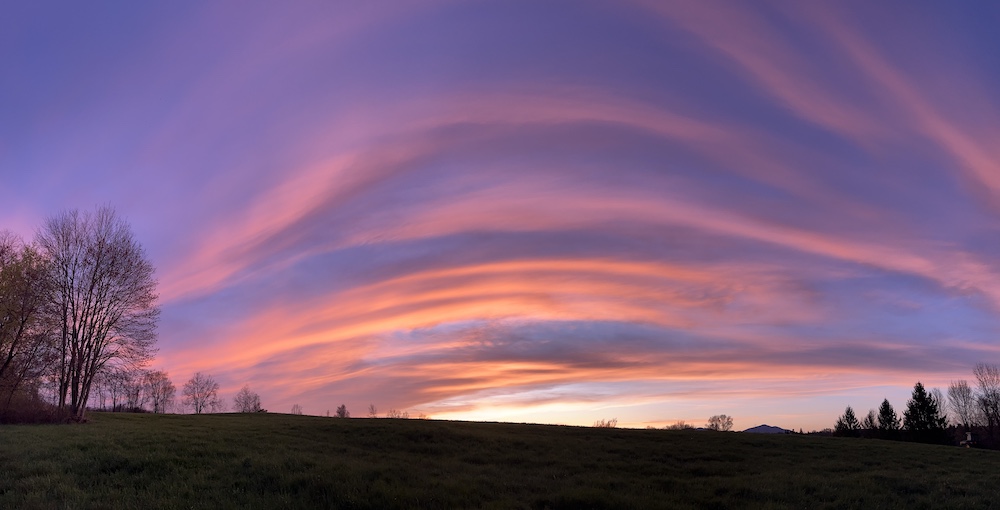
Photos courtesy of Rebecca Collins Brooks
Rebecca Collins Brooks is a farmer, writer and farmstead cheesemaker at Hilltop Farm in Accord, NY. She is the creator and founder of The Meeting of the Milkmaids, a gathering of women working in the cheese and dairy industry. In addition to a small herd of dairy cows, she and her husband, Barton, raise Wagyu beef, selling meat to customers directly off the farm. Her best friends are two terriers, Winston and Molly, and Sylvie, a truly brilliant barn cat. You can visit the farm by appointment to see where truly good food is grown.
Connect with Rebecca via Instagram @catskillwagyu, on Facebook CatskillWagyu
Check out > INSIDE+OUT’s Spotlight on Catskill Wagyu at Hilltop Farm
Write a Comment
You must be logged in to post a comment.



